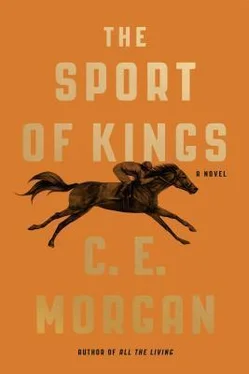He wondered whether his father had visited during his absence.
When he slipped off the bus with his duffel at Knowlton’s Corner, the wind battered him. Unseasonably warm, with the force of a train, it slung a mad cesspool of flyers and candy wrappers, it turned leaves to razors and branches to spears. The neighborhood was still the color of ashes. Jesus. He tried not to think: everything looks the fucking same.
No, I’m changed, I’m grown, I’m seventeen.
Bent into a headwind, he pressed past the old church, past the gas station where two men were hollering at each other across their cars with gruff voices, past the furniture shops filled with cast-offs no one would ever buy, past a restaurant that hadn’t been there before, and down along the row houses, stunted like children who didn’t get enough to eat, starved of sun in the shadow of the overpass. And there was the shotgun. It too was unchanged, its gray paint peeling, its wrought-iron gate swinging by an ancient hinge, but that was all right, who really cares, because he was all right and his mother was all right, everything was going to be all right. He was clinging to the new person he was implementing in his mind, and as he approached, his feet hurried him forward without direct orders.
Momma. He was immediately assailed by the scent of rank mildew and stale cooking and something else, something lower and more personal, something animal, the odor of an unwashed person, her old, familiar smell enlarged and made pungent. Allmon stopped short in the doorway, hesitant as a first-time visitor, his pupils adjusting and one hand reaching forward in lieu of sight. First the marmoreal gleam of the linoleum, silver and gray, then the edge of old shag, then the sofa and Marie lying there with her back turned, her arms drawn up between her chest and the sofa back. His mind was jolted by time’s tricks. Had she not moved an inch in two years?
Momma. He had said the word out loud, and she started from her sleep or her daze. She came round abruptly on the sofa, rolling her weight, which spread ungainly over the entire width of the cushion. Her old shape was all wrong in the dark.
“Allmon?”
He was prepared for a new world. He was prepared to stand in that doorway like a valiant soldier returned or like a husband, all solemn and sure. But he rushed into the room like a child, flinging down his bag and actually shoving the coffee table out of the way, and as Marie was struggling her way to a sitting position, he was on his knees before her, pressing his face into the side of her arm.
“I didn’t know you were coming today. I thought it was tomorrow.”
“I’m home.”
“Babydoll.”
He looked up into her face as she was bending forward, like a groggy animal, struggling to orient in the woken world.
“Momma?”
He switched on the end-table lamp and looked at her, and it took all of his effort not to shrink. Something, some great force of life or death had come and distorted her. It was pressing her essence out of her, turning her into a balloon about to burst — her pendulous breasts and enormous, distended belly, even her cheeks, which were blooming with an unnatural, febrile red. Her eyes were cracked slats, and the few eyelashes that remained were mere black spikes. Her hairline had inched back from her temples, the lineaments of manhood forced upon her once feminine face. And worse, far worse, were the gross lines of pain etched on the face that had murmured once upon an endless time in the forever ago, Hush a bye don’t you cry go to sleepy little baby when you wake you shall have all the pretty little horses blacks and bays dapples and grays coach and six white horses, hush.
He sat back on his heels, surprised by the anger in his voice. “Momma, when’s the last time you went to the doctor?”
“That’s the first thing you say to me?” She turned slightly away, but her scold was shame, as if she couldn’t look at the impossibly robust, vital, searching face of her boy not even in his prime. His very life burned her.
“Momma, what’s going on? What’s happening to you?”
“It’s fine. Better now you’re here.” Her voice was lower than he remembered, husky with disuse. She closed her eyes, and her lips pressed together.
“You still going to work?”
She just shrugged.
For a long moment he just stared at her, corralling love, rage, fear, and disgust into language. Then he said, “I’m here to take care of you. I’m gonna call that doctor we saw, gonna get you fixed up. Seriously. I promise.”
She nodded, looking straight ahead.
“We’re gonna get back on our feet. I’m gonna get some cash. Don’t worry about nothing.”
She didn’t look at him, she didn’t soothe him. She just rolled back to her position with her back turned, and her only reply was a sigh that had no more force than a hush song.
* * *
At 7:00, he was standing on the old, rain-slickened stoop. At 7:01, he was being ushered upstairs by someone he didn’t recognize, some midget in a fucking Cleveland ball cap. At 7:04 Aesop was clapping his hand over his own mouth and crying out with feigned glee like he actually missed him, like he didn’t have a hundred kids ready to join his army—“Oh shit! Smartie!”—shaking his head in amazement like here was the miracle of Lazarus, the last and greatest of all the miracles before the crucifixion, and he was actually witness to the kid crawling out of the tomb, still wrapped in his grave clothes, and gazing confusedly about at this world he thought he had left behind forever.
At 7:24 Allmon was back at work, this time as a dealer, this time with a beeper and a Glock 17.
* * *
The days were brief as the bursts from a flare, and the nights were long as everloving fuck. He was back at the Academy of Physical Education and couldn’t miss a day or show up late without his PO riding his ass, so he played that game. But then he punched the crack clock at five and worked the streets, standing on corners, hitting a couple of reliable houses until eleven or sometimes on into the deepest hours of the night, what his father had once called—
Daddy, you like driving the truck at night?
Eh, nigger’s hours.
All he needed was a solid week of work under the wheeling February sky cluttered with clusters of eyebright stars that made no sense, even less than their names — Betelgeuse, Rigel, the Pleiades and Hyades, the Orion Nebula, upstart Castor and Pollux — to raise some cash for a doctor. Then they’d get it sorted out. This was his herculean labor. This. He was supposed to be straight, he wanted to be straight, but if he looked too close the catch-22 started looking like a noose, like God himself had an APB out on him. So he refused to think. Instead, he worked the familiar streets of Northside, dealing and daring under the schizophrenic Marias, the sea of tranquillity, the sea of chaos, the sea of serenity, the ocean of storms, the ocean of indecision. Door to door on an earth not fixed, waiting for the sun not fixed, in the Milky Way, also not fixed. The goddamned galaxy itself hurtled through black useless space at three hundred kilometers per second toward no real destination, no real purpose. Every object was loose. In this mayhem, he gave himself one week.
* * *
Like that was ever going to work. He was back in it in every way — running, hanging with the crew, pocketing change, wearing a bomber Aesop gave him. He was even standing here in the kitchen again, cooking for Marie, just as he had before they threw him in 20/20 and packed him off to camp. Sly, sassy time messing with his mind, is it 1997 or 1995 or 1985 with Mike Shaughnessy about to walk in the door? No, it’s now. It’s Tuesday, you’ve been home five days, you’re cooking brats and sauerkraut, it’s just crazy how you slip into your old gambling seat at the casino, start stacking chips like you never even went anywhere. This is how addicts must feel raising a bottle to their lips after a long dry spell. He wasn’t going to lie, being on the loop again felt damn good. Both awful and good. That was probably the definition of crazy.
Читать дальше
Конец ознакомительного отрывка
Купить книгу












